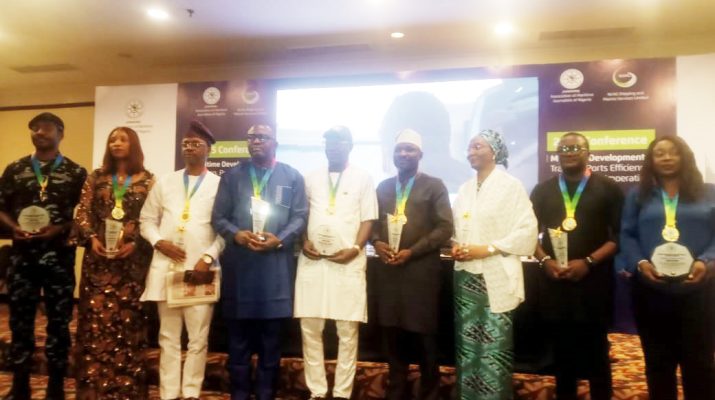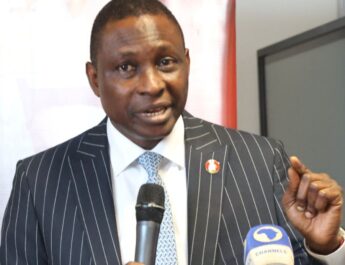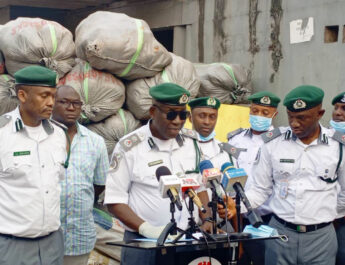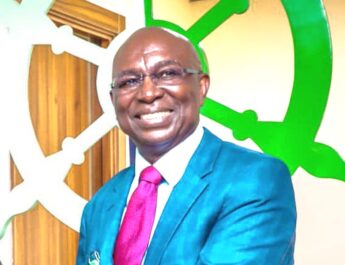The NLNG Shipping and Marine Services Limited (NSML), Nigerian Ports Authority (NPA), Nigerian Maritime Administration and Safety Agency (NIMASA) and the Nigerian Maritime Academy (MAN), Oron and the Nigeria Shippers Council (NSC), among others have pushed for adequate manpower training to ensure that port operations, shipping and the global transportation chain function optimally
By Edu Abade
Stakeholders in the Nigerian maritime industry have stressed the importance of training, capacity building through ports efficiency and shipping imperatives to boost operations in Nigeria’s maritime domain among its global trade partners.
They made the assertion at the 2025 conference of the Association of Maritime Journalists of Nigeria (AMJON) in collaboration with the NLNG Shipping and Marine Services Limited (NSML) with the support of the Nigerian Ports Authority (NPA), Nigerian Maritime Academy (MAN), Oron, Akwa Ibom State and other maritime agencies.
Speaking at the conference with the theme: Maritime Development: Training, Ports Efficiency and Shipping Imperatives, Managing Director of NSML), Mr. Abdulkadir Ahmed, said Nigeria’s maritime sector is in full support of the global green transition, adding that the AMJON Conference, which has been held annually in the past five years signals a transformative era where maritime development has been anchored on training and sustainability.
In his keynote address titled: The Evolving Global Maritime Regulatory Environment-The Role of Maritime Training and Capacity Development, Ahmed, who was represented by Chief Finance Officer (CFO), Mr. Mutiu Olayiwola, pointed out the growing pressure on the maritime industry to respond to global climate goals and new regulatory frameworks.
He maintained that while training remains the cornerstone of industry competence, it must now evolve to meet the demands of a greener, more technologically advanced shipping environment.
“NSML is not just preparing seafarers for today’s challenges; we are equipping them to lead tomorrow’s solutions. We are integrating climate-smart strategies and fostering a culture of innovation to ensure Nigeria’s competitiveness on the global stage,” he said.
He stressed that Nigeria’s maritime workforce must be future-ready, with a curriculum aligned to new environmental mandates, digitization and the decarbonisation of shipping, insisting that capacity development in this context is no longer optional, but a key differentiator for nations seeking relevance in the evolving maritime ecosystem.
Ahmed noted that maritime training institutions, regulatory bodies and industry players must collaborate to raise a generation of skilled professionals capable of navigating the complexities of green shipping, autonomous vessels and zero-emission goals.
The AMJON conference brought together voices from across the maritime sector who echoed the importance of capacity building as a central pillar in transforming port efficiency and ensuring safe, competitive shipping operations.
Panelists at the conference commended NSML’s proactive strategy, highlighting it as a model that should be replicated across both public and private maritime institutions.
Beyond policy, Ahmed stressed how training and skills upgrade remain vital not only for compliance but also for creating jobs, empowering youth and positioning Nigeria as a maritime hub in the African Continental Free Trade Area (AfCFTA) era.
“Nigeria’s path to maritime leadership remains green, digital and driven by people and with NSML’s strategy as a lighthouse, the industry now faces the challenge, and opportunity, of steering toward a sustainable, inclusive future,” he stated.
On their part, the NPA and MAN said there were comprehensive reforms targeted at strengthening manpower development and boosting port efficiency-two pillars seen as critical to unlocking the country’s blue economy.
Riding on an improved cargo throughput, which according to the NPA’s 2024 Consolidated Management Report, surged by 45.1 per cent, or 71.2 million metric tons in 2023 to 103.3 million in 2024, the investments, it is said, will further boost the renewed efficiency and increased trade activity. The surge in the throughput, the report indicated, helped push Nigeria to a trade surplus of N5.81 trillion ($3.7 billion) in Q3 2024, according to data from the Nigerian Economic Summit Group (NESG).
While the NPA revealed it is driving the nation’s logistics transformation with a $1 billion reconstruction of the Tin Can Island Port Complex, alongside the rehabilitation of Apapa, Rivers, Onne, Warri and Calabar ports, MAN, on its part said the institution is aligning its mandate with national economic objectives by producing skilled maritime professionals to meet both local and international demand.
Managing Director of NPA, Dr. Abubakar Dantsoho, who was represented by the Principal Manager, Corporate Affairs, Hadiza Usman Shu’aibu, said the Authority is also leading capacity expansion through the development of new ports at Snake Island, Badagry Deep Seaport, Ondo Deep Seaport and Burutu Port, all of which are at different stages of development.
“The NPA is actively upgrading infrastructure and accelerating digital transformation across Nigeria’s ports to improve cargo handling and attract investments,” he said.
He added that Nigeria has joined the International Port Community Systems Association (IPCSA), paving the way for full implementation of the National Single Window (NSW), a platform designed to streamline port operations and reduce trade bottlenecks.
Dantsoho also noted that the truck congestion at Lagos ports is also being tackled through enhancements to the electronic truck call-up system, which now features satellite parks and time-belt scheduling.
“These measures have significantly eased gridlock and improved turnaround time,” he said. To boost revenue diversification, the NPA, he noted, is exploring public-private partnerships across non-core port services, including bunkering stations, logistics parks, ship repair yards, independent power generation, and freshwater supply.
Under Dantsoho, Shu’aibu further said, the country has also reclaimed regional leadership with his election as President of the Port Management Association of West and Central Africa (PMAWCA)—the first Nigerian to lead the body since its creation in 1972. He is also spearheading the nation’s push for re-election into Category C of the International Maritime Organisation (IMO).
On the manpower front, MAN) disclosed that it was aligning its mandate with national economic objectives by producing skilled maritime professionals to meet both local and international demand.
Public Relations Officer (PRO) of MAN, Domo Umoekpe, who represented the Acting Rector of MAN, Dr Kevin Okonna, said: “Our vision is to be internationally recognised as a centre of excellence in maritime education and training. We are not just training cadets; we are shaping the professionals who will drive maritime growth across Africa.”
Okonna said the Academy has upgraded its training infrastructure with cutting-edge facilities, including four IMO-compliant simulators, a Free Fall Lifeboat with launching davit, engineering labs, survival pools, a marine exhibition hall, and an e-library.
In addition to local cadet training, MAN, he noted, now serves as a regional resource centre, offering instructor training under IMO Model Course 6.09 and hosting students from other institutions such as the Nigerian Maritime University, Okerenkoko.
“The quality of our training has begun to attract foreign students. We’re also pursuing partnerships with IMarEST, the Nautical Institute UK, and CIOTA to secure sea-time placements and keep our cadets aligned with global best practices,” he added.
MAN, he further explained, runs three core schools-Engineering, Nautical Studies, and Maritime Transport Studies, as well as a Seafarers Training Centre offering STCW-compliant short courses and certificate programmes. Its simulator-based training covers no fewer than 12 fully accredited courses aligned with IMO standards.
The NPA and MAN acknowledged the critical support of the Federal Ministry of Marine and Blue Economy, led by Minister Adegboyega Oyetola, in driving the sector-wide reforms.




